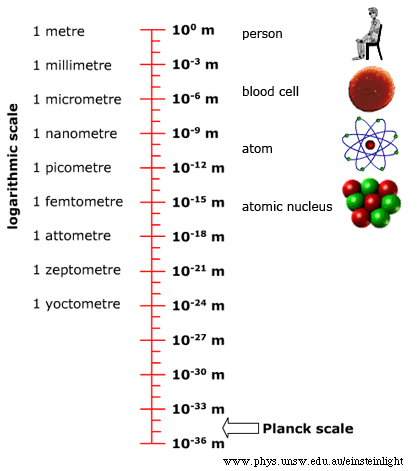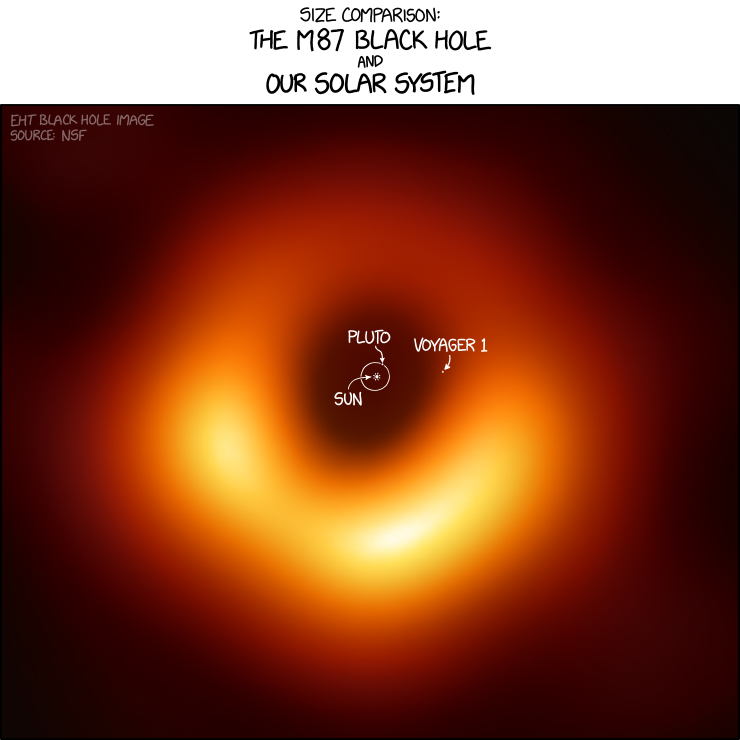-
Posts
523 -
Joined
-
Last visited
Content Type
Profiles
Forums
Events
Posts posted by QuantumT
-
-
17 minutes ago, hipster doofus said:
I wonder what else only exists as math ..oh that's right, objects in superposition.
Particles in superposition are very real and 3D, and has been proven many many times.
What do you think the Large Hadron Collider is measuring?
0 -
2D is unmeasurable, because it only exists in math. There is nothing 2D in the universe, because it cannot exist physically.
Your conjecture is invalid.
0 -
5 minutes ago, Strange said:
It doesn't cause a change. You can measure a wave-like property (e.g. wavelength) or you can measure a particle-like property (eg. location).
But even if it did, I don't see the connection to mass or energy changing.
Thank you for taking the time to answer
 0
0 -
11 minutes ago, Strange said:
What duality are you referring to? Wave-Particle? If so, then all particles, including the Higgs boson, have both wave-like and particle-like properties.
Energy and mass are equivalent. But why would measurement change that?
So you're saying that measurement does not cause a physical wave-particle change?
0 -
Two 3rd's or 66.66%
0 -
Is the Higgs boson involved in duality?
If we interpret duality as energy gaining mass upon measurement, is that then the Higgs being "inserted" at measurement?
0 -
1 hour ago, Strange said:
There is no "void" outside the universe - if there were, it would just be part of the universe!
So that is considered the difference between infinity and finity?
0 -
The universe expands! We can all agree on that.
Some say that the universe is all there is. So the universe expands into what exactly?
What I am trying to figure out is, if there is some sort of void beyond the universe? And if there is, the universe is not all there is, right?
Even a void without space, matter and time is still "something".
The problem of a universe with no void around it, is that it does not expand. It stretches. And if spacetime stretches, everything grows in size. Including matter.
Particles do not change charge or size. If they did, we would be able to see it. So there must be a void out there!
0 -
3 minutes ago, Strange said:
That is not a very good article.
I added your link to the OP.
I just heard a rumor and googled it, and the AP link was all I found.
The question now is, do we postpone the 14th anniversary?
0 -
Quote
Riess observed 70 Cepheid stars — stars that pulse at a well-observed rate — calculated their distance and rate, and then compared them with a certain type of supernovae that are used as measuring sticks. It took about two years for the Hubble telescope to make these measurements, but eventually Riess calculated an expansion rate of 74.
Using that 74 figure means the universe is somewhere between 12.5 billion and 13 billion years old. That’s much younger than the established estimates of 13.6 billion to 13.8 billion.
Article: https://www.apnews.com/fac50d45a19f4239848b1712cfd22c36
Another (better?) article: https://astronomynow.com/2018/07/13/cosmic-mystery-deepens-with-conflicting-measurements-of-hubble-constant/
0 -
Article: https://techxplore.com/news/2019-04-dna-lifelike-machines.html
Paper: https://robotics.sciencemag.org/content/4/29/eaaw3512Engineers at Cornell have successfully used DNA to make tiny life imitating machines. That's how I read it.
Could this be one step closer to understanding the mechanisms that resulted in life itself?
0 -
I know we are at the dawn of black hole exploration, but if (when) we advance at it, should we not be able to see if black holes can generate an Einstein-Rosen bridge?
If such a bridge is possible, should we not one day be able to see matter jumping from hole to hole?
Or would we have to test it ourselves, by visiting a black hole, and taking the leap?
0 -
I never got an answer. Maybe because I asked the question wrong. So here we go again:
Could quantum decoherence be the cause of duality?
The reason I ask is not because it's an idea that I have, but because I've seen others postulate it elsewhere. I just want it confirmed or denied.
0 -
12 minutes ago, Bill Angel said:
That black hole at the center of Messier 87 has a mass of 6.5 billion solar masses.
One wonders if any of those 6.5 billion suns had planets which supported intelligent life.
It would be a real bummer if the astronomers of an alien society had to inform their population that in the distant future their sun and the planet that this alien society occupys are going to be sucked into their galaxy's black hole and annihilated.
Even if there was, we must assume they had seen it coming a long time, and that they were "technologically mature" enough to escape.
If not... bummer!
0 -
1 hour ago, koti said:
My knowledge is limited but it would seem extremely exotic that matter which forms structures all over the universe like stars, planets, houses, animals would suddenly decide that its capable of squashing itself into a region so small its undefined, keep its mass and not rip the universe into oblivion. Not a very scientific statement, I know...but common.
That's exactly what I thought! Almost...
0 -
27 minutes ago, wtf said:
Can you clarify that remark?
The beginning of consciousness is preference. Input or no input. Light or dark.
The next step is additional information. Something in the light or nothing.
Then comes the definition of something. Recognition. Learning.
We could go on for hours!You see, there's no magic in consciousness or intelligence. It can be broken down to simple data.
0 -
4 minutes ago, koti said:
Heres something to put it all into perspective, there are more Hydrogen atoms in a teaspoon of water than there is tea spoons of water in all Earth's oceans. A Hydrogen atom size is 10^-9 m and the Planck length starts at 10^-34 m:
Since the singluarity is below Planck length territory where the concept of left/right up/down straight/backwords stop to have meaning, the very question if a singularity has volume has no meaning.
Yeah I know the Planck scale and particle and atom sizes. I used to have fun by explaining it to my friends. Their jaws would drop.
But it is new to me that so much matter can become so dense in a singularity.
0 -
4 minutes ago, Strange said:
What "powers" a black hole is its mass
So let me rephrase my question: What is the size/volume of the mass that powers the M87 black hole?
0 -
11 minutes ago, wtf said:
I thought I responded to this point earlier.
If I run a perfect simulation of gravity in my computer, nearby bowling balls are not attracted to the computer any more than can be accounted for by the mass of the computer. The simulation doesn't actually implement gravity, it only simulates gravity mathematically.
Likewise suppose I have a perfect digital simulation of a brain. Say at the neuron level. Such a simulation would light up the correct region of the simulated brain in response to a simulated stimulus. It would behave externally like a brain. But it would not necessarily be self-aware.
It's like the old video game of Lunar Lander. It simulates gravity mathematically but there's no actual gravity, just math simulating the behavior of gravity.
I would argue that gravity is a force, and that consciousness is data.
But we'll not know for sure, until it's tested.
0 -
4 minutes ago, Strange said:
The singularity is the centre of the black hole (so not visible, even if it existed) and has zero size.
So you're telling me that the very "thing", that powers a black hole, isn't physical at all? Has no volume?
0 -
2 minutes ago, beecee said:
The singularity [where our laws of physics and GR break down] exist at the Planck/quantum level, as in all BH's.
1 minute ago, koti said:I think a singularity in any black hole doesn't really have a size nor volume.
Even if it is incredibly small, it still has volume, right? Just not something tangible.
0 -
1 minute ago, koti said:
The black hole is approximately 6.5 billion masses of our sun.
Yes, I've also read that. But what about the volume/size of the singularity itself?
0 -
-
2 hours ago, Strange said:
If there is something biological about consciousness, such that a TM-equivalent computer cannot have consciousness, it raises an interesting question.
We can (in principle) simulate all the internal chemical and physical processes of a cell. We can also simulate the interaction of multiple cells. So it would seem a logical conclusion that we could (again, in principle, ignoring the awesome complexity) simulate the interaction of all the cells that make up the brain (plus, if necessary, the rest of the nervous system, blood chemistry, hormone levels, external stimuli, etc).
So if consciousness can't be created by a computer, it implies one (or more) of those stages has to be non-simulatable. But there is no obvious (to me!) reason why that should be the case.
EDIT: I suppose that is almost the inverse of Searle's Chinese Room argument...
I hope I live long enough to have that tested. My money is on the puter.
0





The Classical (relativity)/Quantum Divide has been solved? Q ≤ 2D
in Speculations
Posted
As far as I am aware, they are not measured until and after they collide. That's the whole point of the collider.